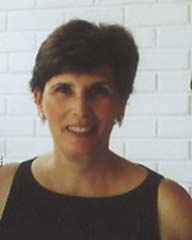












          |
   |

|
It was a total lack of energy that prompted 46-year-old Beverly
to seek medical care. |
Beverly first discussed her symptoms of malaise with her gynecologist –– who was also her primary care physician. “My doctor thought my fatigue was due to being peri–menopausal and recommended I start on hormone replacement therapy, but I was too fearful of taking estrogen since my mom had been diagnosed with breast cancer some years ago. I had put on a lot of weight and suspected my thyroid was the problem, so I saw an endocrinologist for a second opinion.
The endocrinologist recommended hormone replacement therapy, just like my gynecologist. She told me that I was eating too much and that I don't exercise enough and that this was causing me to gain weight. Perhaps, I thought, but I really didn't think this was the cause of my sudden fatigue.
I was beginning to get concerned about how I could continue working. I am a teacher of the visually impaired so I must travel from school to school. When I was travelling in my car, I would get so exhausted that I would have to pull off the road and take a nap. This was not normal for me and it was interfering with my job. I usually had plenty of energy and I could not explain where all the excess weight had come from as I was always careful about my diet –– eating all the right foods.
“Both of my doctors knew of my personal and family history... two parents who had triple bypass surgery; a blood cholesterol of 260 with abnormal LDL/HDL ratio and a history of taking Mevacor – a cholesterol–lowering drug – since the age of 41. Looking back, I don't know how anyone could have ignored those risk factors for heart disease.
“After two failed attempts to get my symptoms diagnosed, I just continued on doing what I had been doing. I was trying to lose weight and I was keeping up with my walking program. I have a dog so he is my “exercise partner”. I walk him every day. Then, one day, my symptoms worsened. I began falling asleep at work because I was just so tired all the time. It felt as if the life was draining right out of me. Shortly thereafter, when I was walking my dog, I got this burning sensation in my throat. It scared me, so I returned home and called my doctor.
“My doctor saw me right away. He told me that my symptoms were related to angina. He ordered a thallium stress test. (Angina is chest pain resulting when the heart muscle does not receive enough oxygen due to decreased blood flow to the heart muscle. The most common cause of angina is atherosclerosis. “Atypical Angina” refers to symptoms other than chest pain that are related to insufficient blood flow to the heart. Some of the atypical symptoms reported include burning sensation in the middle of the chest radiating outward, dizziness with weakness and nausea and shortness of breath.)
“My test results came back abnormal and showed a left bundle branch block. Next, I had a cardiac catheterization. It too was abnormal and showed a 90% blockage of the left anterior descending artery. I immediately underwent balloon angioplasty with placement of a stent to open the clogged arteries feeding my heart. That was four years ago and, with the exception of one re-ballooning procedure, I have been well ever since.
“After my angioplasty, I requested cardiac rehabilitation so that I could exercise in a safe way. It was very frightening to experience heart disease and just having someone there to monitor me and my heart's response to exercise was reassuring. I needed to regain confidence in my own health.
“The weight that I had gained was all due to fluid retention. I am now able to maintain my weight by going to the gym three days a week. I joined the fitness club at a local hotel. I swim in the heated pool, use the exercise room and sauna and then go home and walk my dog. It is a fun way to stay fit!
“For some reason, I cannot resume taking a cholesterol-lowering drug. Since the angioplasty, I seem to have developed a sensitivity to this class of drugs. Therfore, my doctor prescribed a regimen of dietary supplements, including niacin, vitamin B6, vitamin B12, vitamin C, vitamin E, omega fish oil, aspirin and a daily multi-vitamin. (WHF recommends working with your doctor or practitioner if considering taking a dietary supplement). Surprisingly, my cholesterol numbers are better now than they have ever been.
“After I regained my health, I called all of my cousins and warned them about heart disease as it is in our genes. The American Heart Association lists family history as a major risk factor for heart disease. I am so fortunate that I never suffered any heart damage and that my heart rhythm returned to normal. My doctors tell me how lucky I am to be alive, but I had to persevere. I knew I had a serious problem and that I desperately needed a diagnosis. I now follow-up every 6 months with a visit to my cardiologist . My cardiologist listens to me. ”
Articles |
Newsletters |
Recipes |
Women's Stories |
Press Releases |
Wellness Calendar
Back to top
Disclaimer | Donate Now | Contact Us | Site Map | Store
|
©1999-2000; updates: 2002, 2004, 2005, 2007 Women's Heart Foundation, Inc. All rights reserved. Unauthorized use prohibited. The information contained in this Women's Heart Foundation (WHF) Web site is not a substitute for medical advice or treatment, and WHF recommends consultation with your doctor or health care professional. |